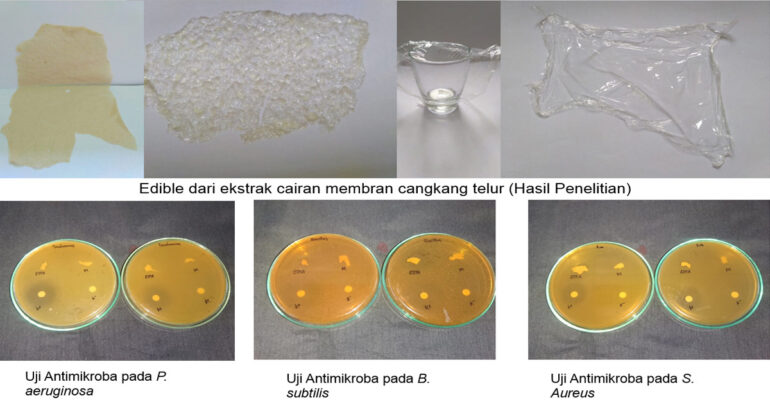IPB University Students Utilize EggShells as a Natural Preservative for Tofu

Indonesia is a country of which the majority of the people consume eggs as an affordable source of protein aside from meat. From a research’s data, it was noted that eggs produce waste in the form of eggshells with 9-12 percent of the total weight. That means there is almost 170 tons of eggshell waste produced each year in Indonesia. The number of eggshells is a pollution for the environment, a source of unpleasant smell, and draws disease-spreading pests.
Those facts motivated IPB University students, Listia Dwi Ramadhani from the Department of Community Nutrition, Melati Maeky Permata from the Department of Food Science and Technology, and Mohamad Nizar Rizky from the Department of Agroindustrial Technology conduct a research utilizing eggshells. The research is titled “Antimicrobial Edible Packaging Based on Eggshell Membrane as a Natural Preservative for Tofu”. The research is advised by Dr Eny Palupi, STP, MSc from Community Nutrition Department, Faculty of Human Ecology, IPB University.
Listia, as the team leader, explained that eggshell membrane has biocompatible and biodegrading characteristics. Besides those, its pored structure contains acid and non-collagenous protein. That means eggshell membrane naturally has antimicrobial activity from Ovocleidin-17 (OC-17). The protein can bind microbe’s polysaccharide, inhibit the formation of peptidoglycan and microbe’s cell wall, causing cell lysis.
“That ability is very potential to be utilized as an edible film packaging as well as to prolong the shelf life of foods vulnerable to damage and rotting, such as tofu. Tofu has a high water content, so it is easy to degrade and attract bacterial growth. There are still many tofu producers in Indonesia who use formalin to increase tofu’s shelf life,” she explained.
The use of formalin has been abused as a food preservative. The people who use it that way don’t know that the protein contained in tofu reacts with and is damaged by formalin, reducing the quality of the tofu.
Tofu has a high water content, and nutrients, such as carbohydrate, protein, fat, and mineral i.e. potassium, phosphor, magnesium, and vitamin B, causing tofu to be vulnerable to contamination by proteolytic bacteria, such as lactate acid bacteria, i.e. Enteric bacteria, and Pseudomonas.
The benefits of edible packaging is that it can reduce the microbe contained in food, so that it can be an alternative to reduce the use of formalin as a food additive.
From this study, an edible packaging based on eggshell membrane formulation is produced to envelop tofu in safe and environmentally friendly manner.
“We managed to create five pans of edible film from 100 grams of eggshell, with the size of the pan 30×10 centimeters. The eggshell membrane which has an antibacterial potential is the one which is added by EDTA (Etylene Diamine Tetraacetate Acid),” she said.
Listia hopes that, with this research, eggshell waste utilization can reduce its adverse impacts to the environment. Besides that, the use of edible packaging is also expected to increase the shelf life of tofu and reduce the usage of dangerous preservative (formalin). (Ard)



